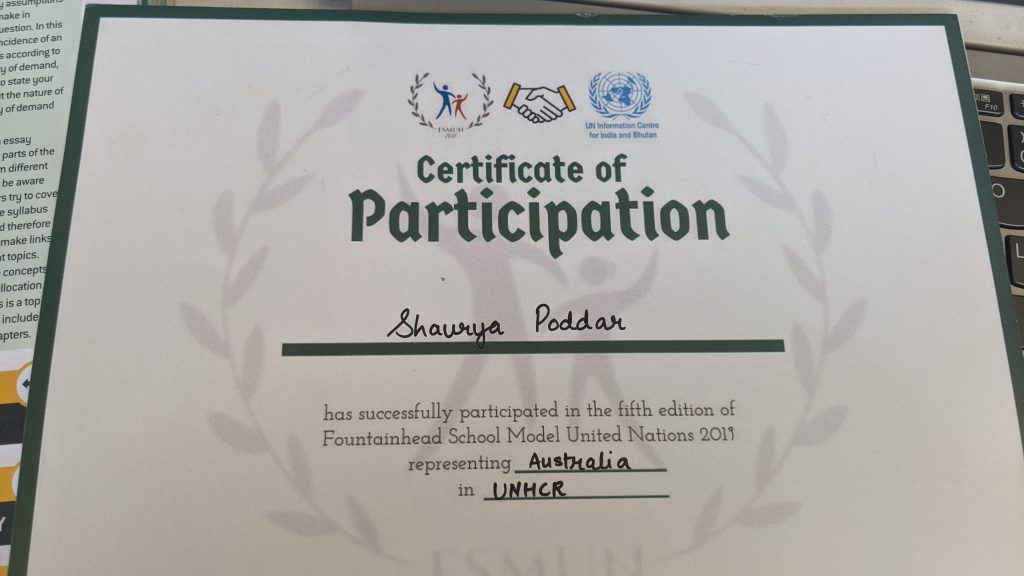For this CAS experience I joined the FSMUN(Fountainhead School Model United Nation) where I was the delegate of Australia. The committee I joined was UNHCR. In the committee, we were tasked to find a solution to the Rohingya crisis. This experience was very different for me as on the last day I was forced to switch my nation to Bangladesh. As the previous delegate refused to come. It was very fun. I was also given an oral distinction.
L1.Identify own strengths and develop areas for growth
With being responsible for a nation( even if it was made belief) I was tasked to be a humanitarian but also a selfish man only looking to help his own nation. Yes the last part is not something that one should be proud about but it is necessary when one is working with other competing nations. I faced both extremes. When I was the delegate to Australia, my main task was to help the Rohingya’s, but when I switched to Bangladesh My priorities changed completely. My sole purpose was to get Rohingya’s out of my nation regardless of what happens to them. This may have helped to grow as a person. I learned that the world is not perfect, and may never be, I will be the only person who will stay in my corner forever. I now know that I should always think of my own protection, and be prepared for every possible scenario, because the person I am against won’t let any stone unturned.
L2
The greatest challenge I faced was switching nations. I was switching from the protagonist to the antagonist within a moment with no information or points of defense or offence. The change was great but I was able to rise to the occasion by believing in myself. While I was faced with this change I learned a new skill, a skill that I now consider very highly of. That skill is the ability to change my mind, when I was the delegate of Australia I found Bangladesh nothing but Guilty, I was stubborn that nothing could change my mind. This all changed when I switched and saw that Bangladesh is also not wrong but was just caught a victim in a global refugee crisis with its own economy under crisis. So in conclusion Because of the challenge of changing the nation, I was able to learn a new skill, how to change your perspective and look at things differently.
L3
With me going to the FSMUN I needed to plan a lot of things. A week before the conference I initiated work on the Rohingya’s and Australia. I was very excited and nervous at the same time. I was excited to learn so much about all the issues that were happening across the world, it gave me a new pair of lenses for the world and I accepted it. I may not be happy with it but I do accept it. I was nervous because I knew nothing about what I was about to face. So I started to make a plan. The plan went like this: I would first announce my stance on the subject to the entire committee, second I would slowly form blocks, making sure that either a person is with me or against me. Make the opposite team filled with guilt, expose their previous mistakes and find them wrong in any way possible. Then after the first day I start to find weakness in my allies, the reason for that is that these people might agree that Rohingya’s need help and they might not agree adding my name to the resolution paper.
L4
I believe there is no better way of showing commitment than sticking to the situation no matter how bad it gets. This happened when I switched nations. I had to find flaws in my own “perfect plan of action”, I was attacked by the very people who were once my allies, I had to convince delegates to join my side, against my previous ideas. Even when all hope was lost I did not lose my support or commitment to that delegacy or the committee.
L5
I used my skills of collaboration, to help get votes on my resolution, when I was the Delegate of Australia. Even if I found a nation or the delegate not very likeable, I knew that I needed to be the bigger man. The resolution was a force greater than myself, and I had to rely on the benefits of collaboration to get my way. No man is an island and when you live outside the island you must collaborate.
L6
For many centuries, Rohingyan Muslims lived in the Rohingya state of Burma. But after an ethinic cleansing led by the Burma’s military saw them be displaced, villages burned, people killed and families separated . This caused millions to enter Bangladesh, India and China causing a global refugee crisis.
L7
In the committee I was often faced with questions of morals and ethics. In the crisis the Rohingyan’s may be victims, and it should have been our job to help them, but I also understand the stance of India and China, nations which were reluctant to give the Muslim refuges. Both nations were already facing their own issues. Both the nations were the most populated nations on the surface of earth and almost always under riots and protests. Hence I was able to see the ethics of the decisions of the people, and understand there consequence
